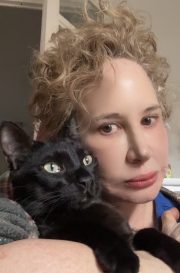Steven Gould: A “Professional” Writers Organization
 I am often asked what is the Science Fiction and Fantasy Writers of America. My shorthand answer is that we are an organization of Professional Writers working and publishing in the SF & Fantasy field. But what is this thing “professional?”
I am often asked what is the Science Fiction and Fantasy Writers of America. My shorthand answer is that we are an organization of Professional Writers working and publishing in the SF & Fantasy field. But what is this thing “professional?”
A Profession in its most formal sense is a trade/occupation that requires an extensive specialized education, has a purpose to provide objective counsel and service to others, and benefits society as a whole. In the medieval period there were only three Professions: Divinity, Medicine, and the Law, though nowadays the list it much larger (and still doesn’t, by the way, include Writing or Art. List of Professions).
So, in the above sense, a Professional is a qualified member of one of the Professions and comports himself according his Profession’s codes of conduct. Members of “the professional class” are expected to be in a certain income range and have a certain status. In addition, despite some progress, race and gender in formal Professions has been and continues to be disproportionately represented.
Professions have regulatory bodies that determine who is and isn’t qualified to practice in their field. Lawyers have bars, Doctors have medical boards, Architects have boards of examiners, and Accountants have Public Accountancy Boards. All of these boards have codes of conduct and standards of professional ethics.
So, fellow writer, are you ready to sign up for a Profession?
Did you take a post-graduate university degree in writing (Some of you did.) Have you taken board exams to determine if your writing meets the strict quality guidelines of our genres? Are you prepared to comport yourself according to the strict behavioral guidelines of our governing board?
I didn’t think so.
Writing is not a profession in the the capital ‘P’ sense. We are professional writers in the sense that some football players are professional athletes—because we are paid for our work.
Writers differ wildly in process, income, critical reception, financial success, and personal satisfaction with their status as writers.
I know writers who produce multiple novels a year and writers (like myself for the first 10 years of my career) who only average a single short story per year. I know writers who have six figure annual writing incomes and three figure annual incomes. I know award-winning writers unhappy with their level of commercial success and commercially successful writers unhappy with their level of award recognition. I know writers with boxes of rejection letters and writers with one thin folder of rejection slips. I know writers who always make their deadlines and writers like Douglas Adams who “love the sound of deadlines whizzing past.”
I have heard arguments that many of these writer subsets do not rise to “professional” levels for reasons varying from their conduct to their level of income to the quality of their prose to the volume of their output to the nature of their sub-genre to the degree of critical recognition they have received. Some of those arguing seem to want to apply the standards of a formal “Profession” to our field.
Yet everyone of those wildly diverse writers was paid for their work and this is the standard we use to determine membership in our professional writers organization.
As an organization should we be telling our members how, when, and what they should be writing? Of course not. Does this mean we should abandon all the ideas embodied in a formal profession?
I’m just as happy not to have a Board of Examiners reviewing my fiction to see if it rises to “professional” levels. I’m particularly happy to drop associations with social class, even if it means we aren’t automatically granted an associated higher status. I believe that art in general and Science Fiction in particular does benefit society but I certainly don’t think we should evaluate art by that standard alone.
While I am not prepared to generate a formal code of conduct beyond our organization’s existing harassment and diversity policies, one thing I would urge writers to embrace—to practice—is the concept of acting professionally.
Neil Gaiman (and others) talk about the tripod of “deliver on time,” “be talented,” and “be nice to work with.” He points out that as long as you can come through on two of these, you can have a career, because people will forgive the weaker third leg.
This is, of course, a very simplified version of what it takes to be a working artist, but at least two of those legs are embodied in the general principles of professional behavior: responsibility, honesty, respect, fairness, and trust. These boil down to conducting yourself in such a way as to make others think of you as reliable, respectful, and competent.
How do you manage this? Especially when most of us have this inner voice that is screaming, “IMPOSTER! They’ll find you out! Fraud!”
Pretend. Act. Lie if you have to.
Not to others, but to yourself.
How do you become a professional? Act like one, in both meanings of the word. Inhabit the role. How do professionals speak? How do professionals act? How do professionals behave? How do they treat their readers, editors, agents, those writers with more success in the field, and even more importantly, to those writers who are behind them on their career path?
Observe. Evaluate. And when appropriate, emulate. One morning you’ll wake up and you won’t be pretending anymore.
Who taught me to behave professionally? 99 percent of them were the members of SFWA, women and men welcoming a socially awkward, brash, deeply insecure young man into their number, forgiving his missteps, and, by example, showing him how to go on.
This wasn’t why I joined SFWA, but it is why I stayed, why I have worked, why I have served a total of five years as a board member, and why I will stay a member as long as I live.


